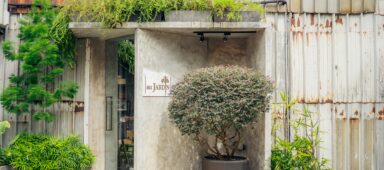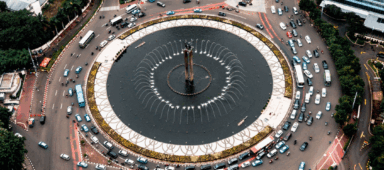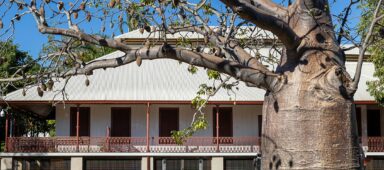Earth Heir collaborates with Mah Meri women to produce exclusive crafts for Malaysia Airlines
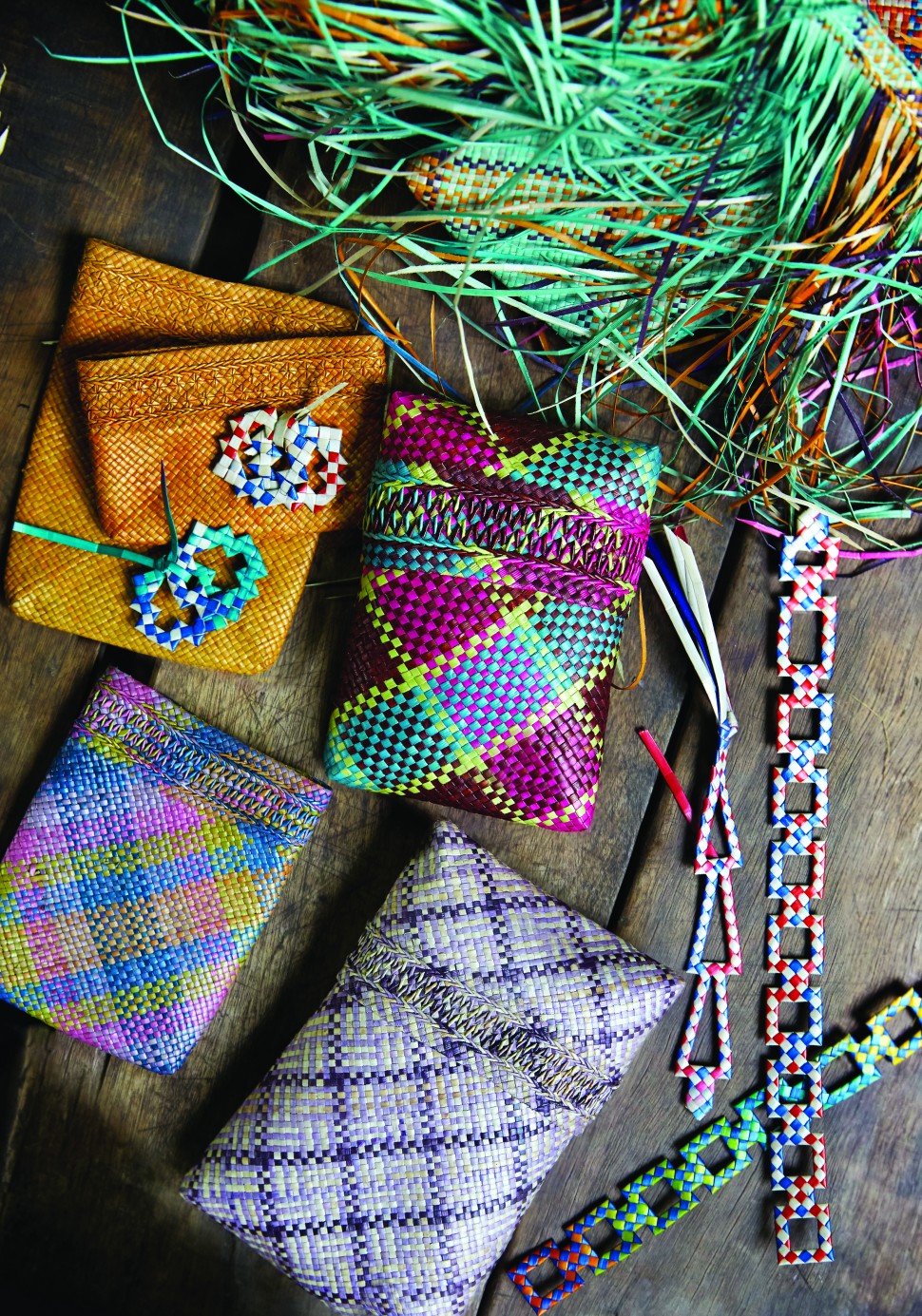
On Pulau Carey, an island in Selangor, Malaysia, inhabited by the Mah Meri indigenous tribe, the community demonstrates their pride in their heritage through customs such as Ari Muyang, a celebration in honour of their ancestors, and by passing down their traditions from one generation to another. One of these traditions is an artform practised by the Mah Meri women, which unlike the woodcarvings made by men, went largely unnoticed outside their community.
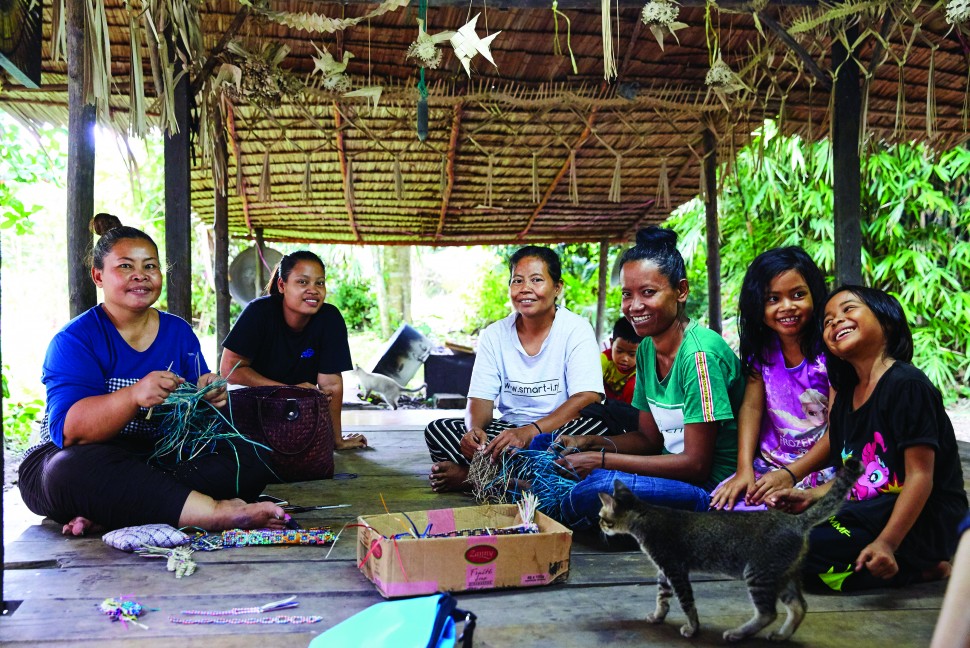
“When I was a child, after we came home from school and spent time playing, we would sit down to weave. Whether it was coconut or banana leaves, we learned the proper way to hold them and then weave them into products,” says 50-year-old Maznah Unyan. The women would make use of the crafts, comprising bags, pouches, and baskets, themselves or sell them to their friends. However, Maznah began considering the larger commercial potential of her handicrafts when she came across an article in a magazine.
“I was 18 at the time and saw an article about handicrafts from Terengganu while staying at my cousin’s house. The article had a photo of a pretty flower-patterned mat.” She told her cousin that she wanted to learn how to create and sell similar products, and he responded with derision. “My cousin told me ‘that’s not possible, Maznah, you don’t have higher education!’” recalls Maznah, who adds that she only studied at the primary school level. “I remember his words to this day.”
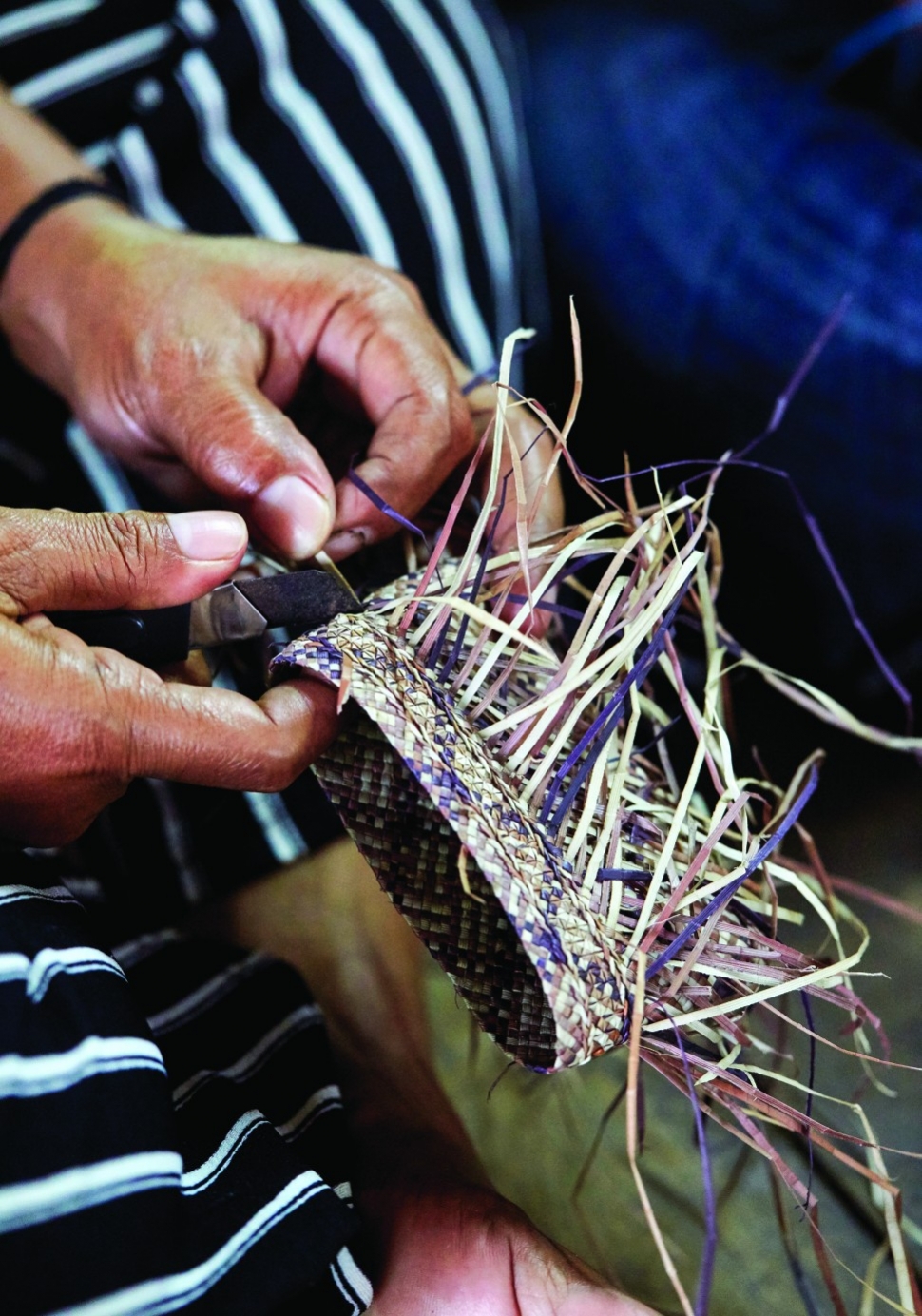
Although she was disheartened, Maznah continued to weave until she settled down and started a family. Her time was then occupied with earning a living through fishing and farming to support her family. When an illness rendered her unable to continue with physically demanding work, Maznah worried about how she would continue to provide for them. “I spent quite a lot of time thinking about that.”
Fortuitously, the answer to her ponderings arrived during the Ari Muyang celebration. A visitor to the island inquired about crafts made by women, and word got back to Maznah. After consulting with her mother, who advised her to make bujam lipos, a type of pouch that is traditionally used to store tobacco or betel nuts, Maznah got together with some other women to make the colourful pouches. “We hadn’t made bujam in a long time,” she says. But the item was well-received, prompting the visitor to return again and again to the island requesting more. “She kept coming back after a week, two weeks, to our village because the demand for the pouches was high. Her friends loved them,” says Maznah. “After that, we started weaving other items like bookmarks and baskets.”
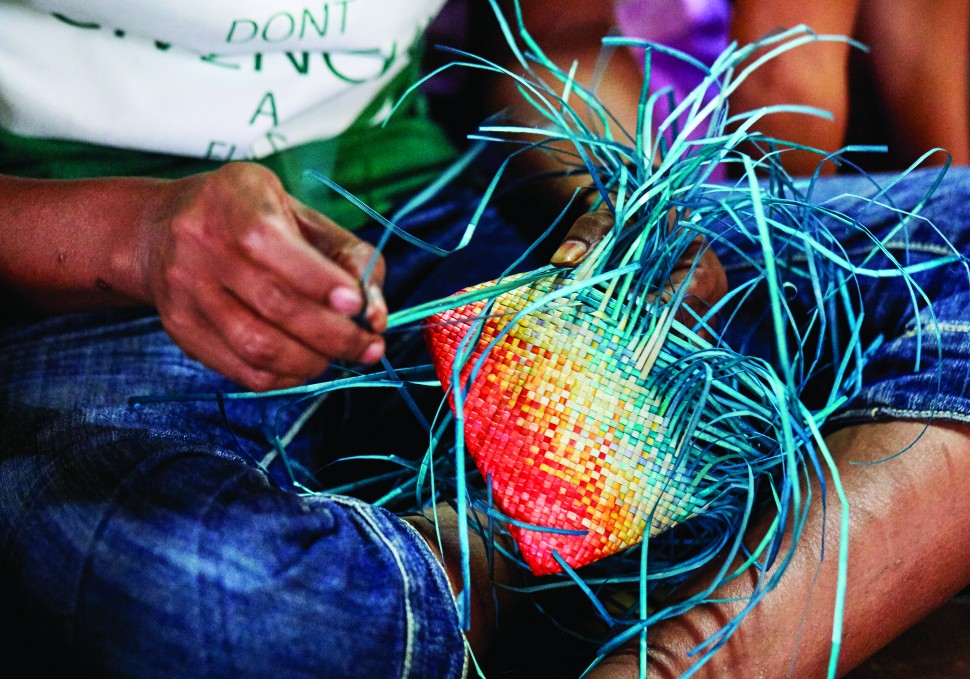
She explains that once you understand the basics of weaving, it is easy to create a variety of products. As we talk, Maznah’s fingers are hard at work weaving strands of green and light beige pandanus into a squarish shape. She is joined in this interview by two of her friends from her weaving circle, Anom and Tijah, who let her do most of the talking while they smile shyly in the background. The women grow the pandanus plant themselves in their front yards and also process them for weaving.
Maznah says she was met with resistance when she initially approached other women to participate in her weaving enterprise. “At first they did not want to join. But we told them, these products sell. Rather than sit around gossiping, let’s make some money.” She cannot recall how she met Sasibai Kimis, founder of Earth Heir, a social enterprise that works with artisans from marginalised communities to promote heritage crafts, but she says business has blossomed since they started collaborating. “When we got the order from Malaysia Airlines, our sales has flown up even higher,” she says, laughing at her own pun.

Through Earth Heir, Malaysia Airlines has commissioned a range of custom-made products from the Mah Meri women as part of the airline’s effort to support homegrown small- and medium-scale enterprises (SMEs) in line with a campaign called ‘Hospitality Starts With Us’. From June to August this year, the exclusive Earth Heir line consisting of a set of bookmarks and bracelets weaved by the Mah Meri women, as well as postcards featuring some of the artisans under the enterprise’s banner will be available for sale on Malaysia Airlines flights.
According to Maznah, this is the first time they have had to weave products according to specification. When asked if that was a challenge, she hesitates, but the mostly quiet Anom immediately chimes in, “it was hard.” Her quick response and the intensity of her answer hints at the challenges that come with stepping outside their comfort zone. Wong Xiao Cheng, Chief Operating Officer of Earth Heir, admits that the pressure of meeting customers’ requirements can sometimes get to the artisans.
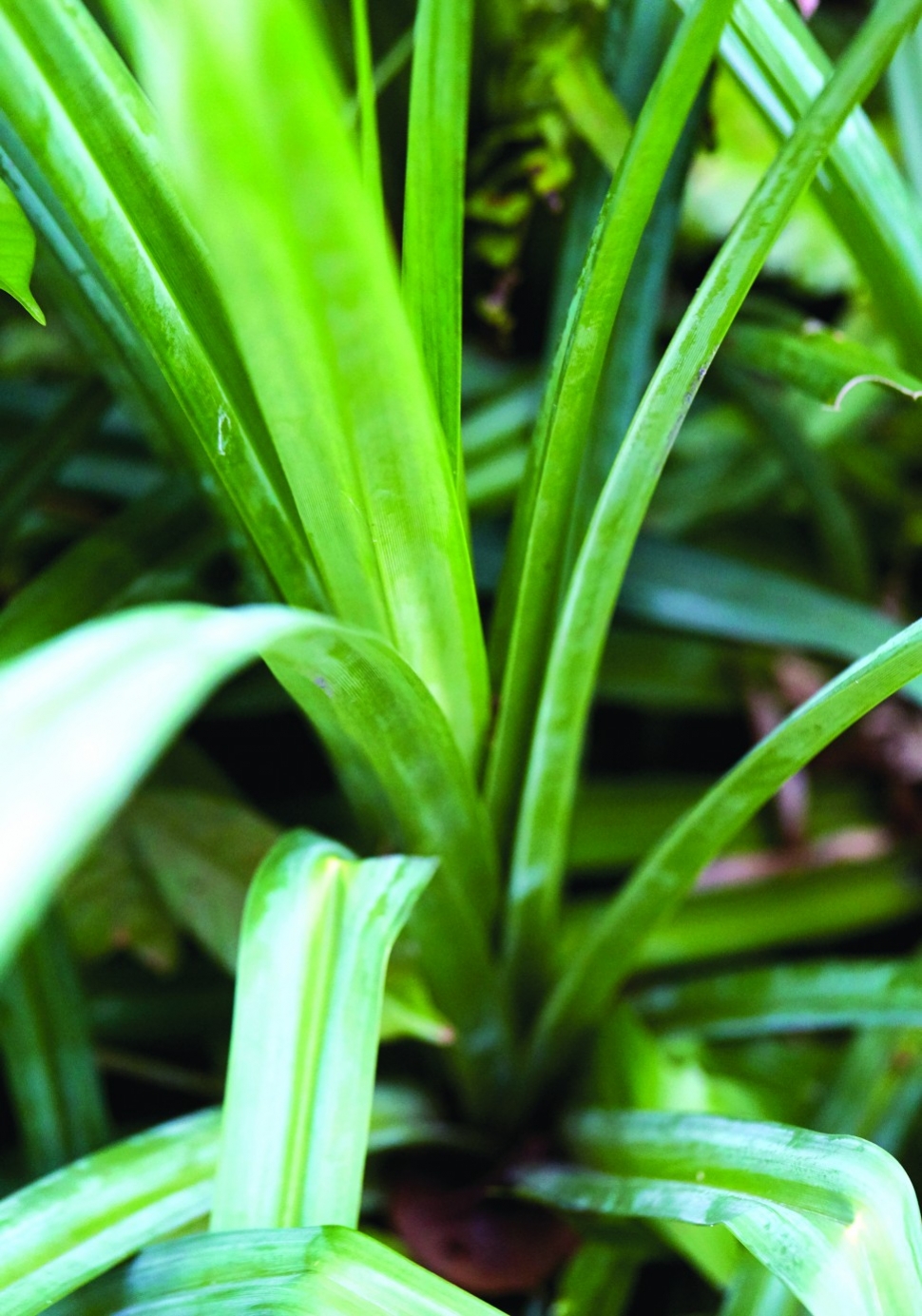
“Quality control is very important to us. There are certain guidelines we have to follow like the colours, the shape, and the weave can’t be loose otherwise the product will break,” she explains. “Once when I visited them in the village, I put aside 20 bookmarks and said ‘this won’t do, the customers won’t buy something like this.’” The artisans were unhappy, but Wong was quick to explain that customers had certain preferences.
“That was my first or second time there so maybe I just hadn’t learned how to communicate or adapt to them. Every group has a different temperament.” Earth Heir works with over 100 artisans throughout Malaysia, including those from other indigenous tribes, refugee communities and differently abled individuals to showcase heritage art forms and promote their value. Handwoven scarves and blouses made from light fibres of silk, colourful handcrafted bags and baskets made from recycled plastic strips, as well as delicately hand-stitched embroidered jewellery are just some of the items available for purchase at their retail space-cum-gallery in the Kuala Lumpur neighbourhood of Ampang or at their online store.
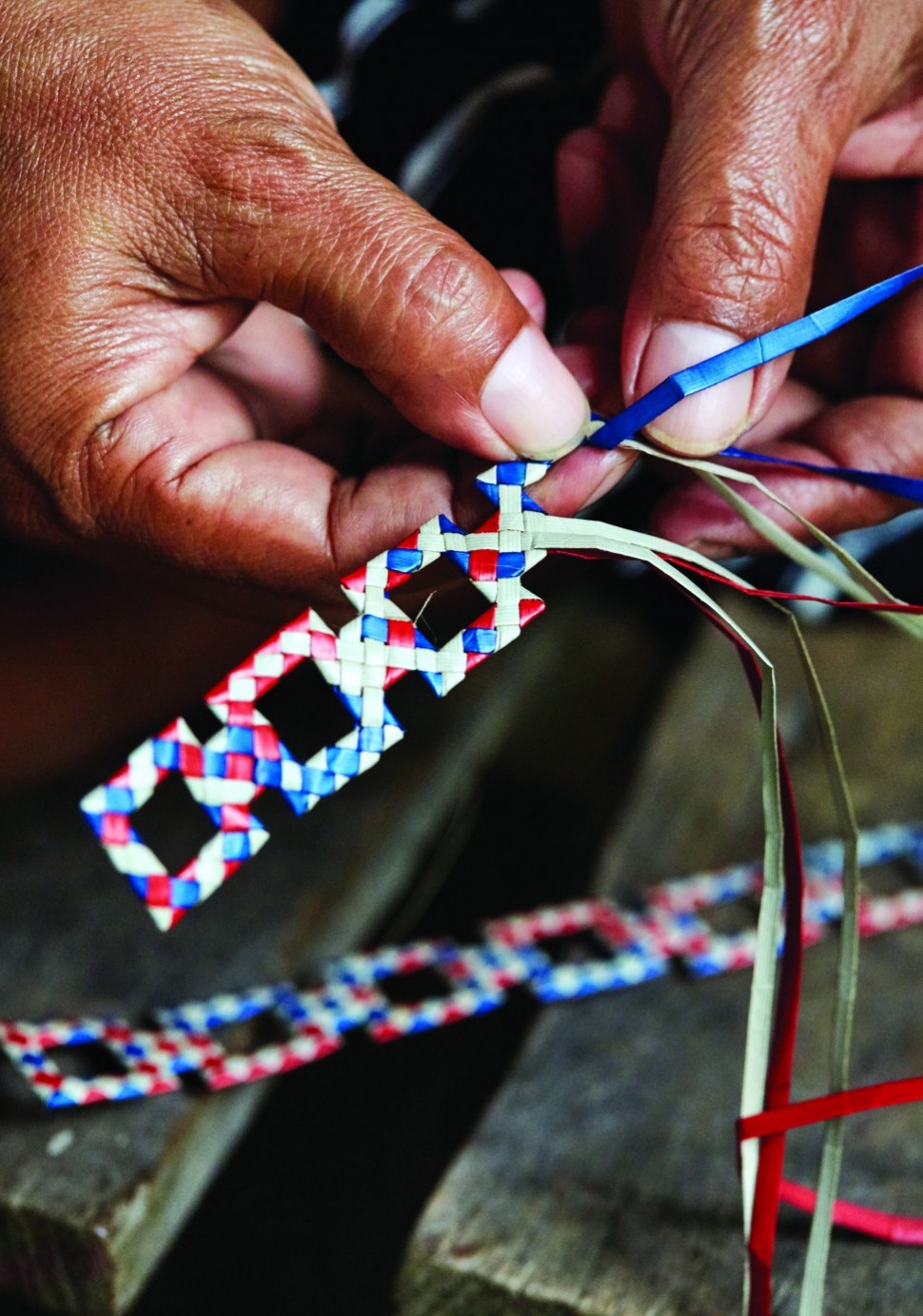
“The goal is that people appreciate these handmade things and are willing to pay a premium price for them because they can keep them and use them for a long time,” says Wong. She maintains that prior to working with Earth Heir, some of the artisans were reluctant to raise their prices because they feared that nobody would buy their products. “One of our artisans actually said she wasn’t sure if anyone out there would like her handicrafts.”
Now, artisans like Maznah say they can earn a living from their handwoven products. For Maznah, she has also cultivated a reputation as an expert at her craft. “Just like Malaysia Airlines is known throughout the world, we would also like our handcrafted products to be as famous throughout the world,” she says with a serious expression before breaking into a giggle.



